Ukrainian-Lebanese documentary film Three Stories of Galicia shown in Ukraine
Wednesday, 23 November 2011, 13:46 The showing of the documentary film Three Stories of Galicia was held in five cities in Ukraine – Kyiv, Kharkiv, Lviv, Chernivtsi and Odesa – from November 15 to 21, 2011. The film directors are Olha Onyshko, who is Ukrainian, and Sarah Farhat, who is Lebanese. Through the stories of three lives, the film tells about WWII and the history of the Holocaust and the Ukrainian liberation movement, as well as relations between Ukrainian, Poles and Jews in Galicia.
The showing of the documentary film Three Stories of Galicia was held in five cities in Ukraine – Kyiv, Kharkiv, Lviv, Chernivtsi and Odesa – from November 15 to 21, 2011. The film directors are Olha Onyshko, who is Ukrainian, and Sarah Farhat, who is Lebanese. Through the stories of three lives, the film tells about WWII and the history of the Holocaust and the Ukrainian liberation movement, as well as relations between Ukrainian, Poles and Jews in Galicia.
In the first story of a Jewish community representative, Aharon Weiss shares his memories of how he, along with seven other Jews, were hiddenand fed by a Ukrainian woman, and then how Weiss’ family rescued from the Soviets a Ukrainian who served as a Nazi policeman. The second story tells about Olia Ilkiv, the messenger of the commander of the UPA Roman Shukhevych, who spent 14 years in prisons, as her children grew up in an orphanage, where they were told their parents are criminals. At the time of filming she was 90 years.
The third story is of a Polish priest in Przemysl Stanislav Bartminski, who cared for the Ukrainian churches and cemeteries. He ministered in aparish, where three peoples – Ukrainian, Polish and Jewish – lived for centuries, and who then were forced to leave their ancestral lands. The world premiere took place in Germany, USA and France. The filmmakers collected material for four years, traveling through Galicia. “Many stories were left outside the frame. We put emphasis on people who ‘created the civilization of Galicia,’ which, unfortunately, was destroyedafter WWII,” filmmaker Olha Onyshko told a correspondent of the Lviv newspaper Vysokyj Zamok.
In the first story of a Jewish community representative, Aharon Weiss shares his memories of how he, along with seven other Jews, were hiddenand fed by a Ukrainian woman, and then how Weiss’ family rescued from the Soviets a Ukrainian who served as a Nazi policeman. The second story tells about Olia Ilkiv, the messenger of the commander of the UPA Roman Shukhevych, who spent 14 years in prisons, as her children grew up in an orphanage, where they were told their parents are criminals. At the time of filming she was 90 years.
The third story is of a Polish priest in Przemysl Stanislav Bartminski, who cared for the Ukrainian churches and cemeteries. He ministered in aparish, where three peoples – Ukrainian, Polish and Jewish – lived for centuries, and who then were forced to leave their ancestral lands. The world premiere took place in Germany, USA and France. The filmmakers collected material for four years, traveling through Galicia. “Many stories were left outside the frame. We put emphasis on people who ‘created the civilization of Galicia,’ which, unfortunately, was destroyedafter WWII,” filmmaker Olha Onyshko told a correspondent of the Lviv newspaper Vysokyj Zamok.
LATEST NEWS

We can imagine what the prayer of the prisoners in the Russian torture centers in the Ukrainian Kharkiv region was like – Head of the UGCC on the 206th day of the war 17 September
A vast cemetery, a mass burial, was found near the city of Izyum, in which more than 400 innocently killed and tortured people have already been...
-
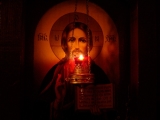 Глава УГКЦ у 158-й день війни: «Нехай Господь прийме з уст нашої Церкви псалми та моління за всіх тих, які особливо просять нашої молитви»
Глава УГКЦ у 158-й день війни: «Нехай Господь прийме з уст нашої Церкви псалми та моління за всіх тих, які особливо просять нашої молитви»
-
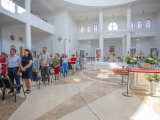 «Сила, яка походить із вірності Христові, є стержнем, який ніхто не може зламати», – Блаженніший Святослав
«Сила, яка походить із вірності Христові, є стержнем, який ніхто не може зламати», – Блаженніший Святослав
-
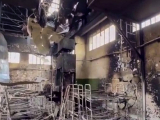 Глава УГКЦ у 157-й день війни: «В ім’я Боже ми засуджуємо звірства в Оленівці і світ повинен це засудити як особливий вияв дикості й жорстокості»
Глава УГКЦ у 157-й день війни: «В ім’я Боже ми засуджуємо звірства в Оленівці і світ повинен це засудити як особливий вияв дикості й жорстокості»
-
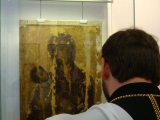 «Боже, почуй наш плач і поспіши нам на допомогу і порятунок!», – Глава УГКЦ у 156-й день війни
«Боже, почуй наш плач і поспіши нам на допомогу і порятунок!», – Глава УГКЦ у 156-й день війни
-
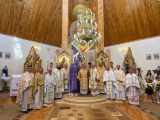 «Бог йому дав серце і душу українського народу»: відбулася щорічна проща до Прилбичів з нагоди уродин митрополита Андрея Шептицького
«Бог йому дав серце і душу українського народу»: відбулася щорічна проща до Прилбичів з нагоди уродин митрополита Андрея Шептицького
-
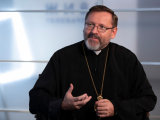 Глава УГКЦ: «Я горджуся українськими патріотами, які без найменшої краплі ненависті готові захищати своє»
Глава УГКЦ: «Я горджуся українськими патріотами, які без найменшої краплі ненависті готові захищати своє»
-
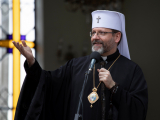 Блаженніший Святослав закликав українську молодь скласти присягу на вірність Христові
Блаженніший Святослав закликав українську молодь скласти присягу на вірність Христові
-
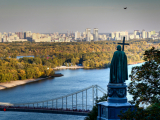 Глава УГКЦ у 155-й день війни: «Помолімося, щоб не втратити скарбу віри князя Володимира»
Глава УГКЦ у 155-й день війни: «Помолімося, щоб не втратити скарбу віри князя Володимира»
-
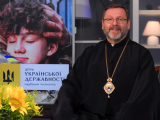 Блаженніший Святослав у День державності України: «Наша Держава – це для нас питання життя або смерті»
Блаженніший Святослав у День державності України: «Наша Держава – це для нас питання життя або смерті»
-
 Глава УГКЦ у 154-й день війни: «Нехай Господь Бог прийме у свої вічні обійми журналістів, які віддали за правду своє життя в Україні»
Глава УГКЦ у 154-й день війни: «Нехай Господь Бог прийме у свої вічні обійми журналістів, які віддали за правду своє життя в Україні»
-
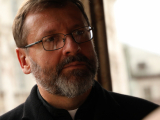 Глава УГКЦ у 153-й день війни: «Принесімо наш біль перед Боже обличчя і будьмо певні, що Він нас вислухає»
Глава УГКЦ у 153-й день війни: «Принесімо наш біль перед Боже обличчя і будьмо певні, що Він нас вислухає»
-
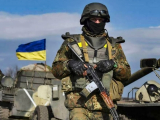 Глава УГКЦ у 152-й день війни: «Помолімся молитву заступництва за наших воїнів»
Глава УГКЦ у 152-й день війни: «Помолімся молитву заступництва за наших воїнів»
-
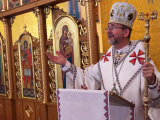 «Віруюча людина не може бути байдужою, коли бачить страждання іншої людини», – владика Богдан Дзюрах
«Віруюча людина не може бути байдужою, коли бачить страждання іншої людини», – владика Богдан Дзюрах
-
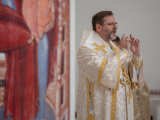 «Серед нашого страждання творімо простір для прояву Божої всемогутності», – Глава УГКЦ у 6-ту неділю після П’ятдесятниці
«Серед нашого страждання творімо простір для прояву Божої всемогутності», – Глава УГКЦ у 6-ту неділю після П’ятдесятниці
-
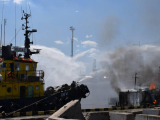 Глава УГКЦ у 151-й день війни: «Російське віроломство ми перемагаємо силою любові до нашої Батьківщини»
Глава УГКЦ у 151-й день війни: «Російське віроломство ми перемагаємо силою любові до нашої Батьківщини»

